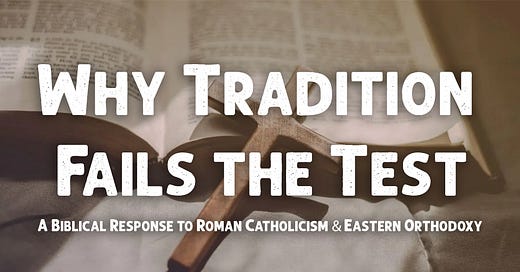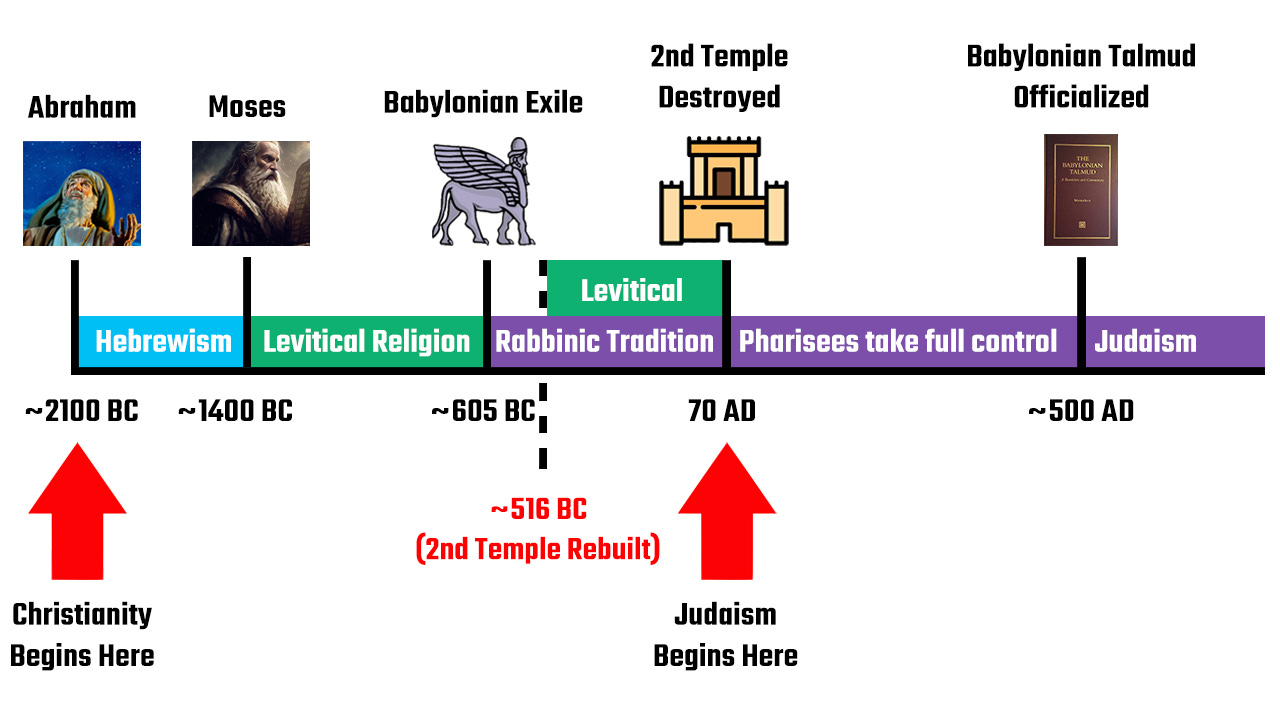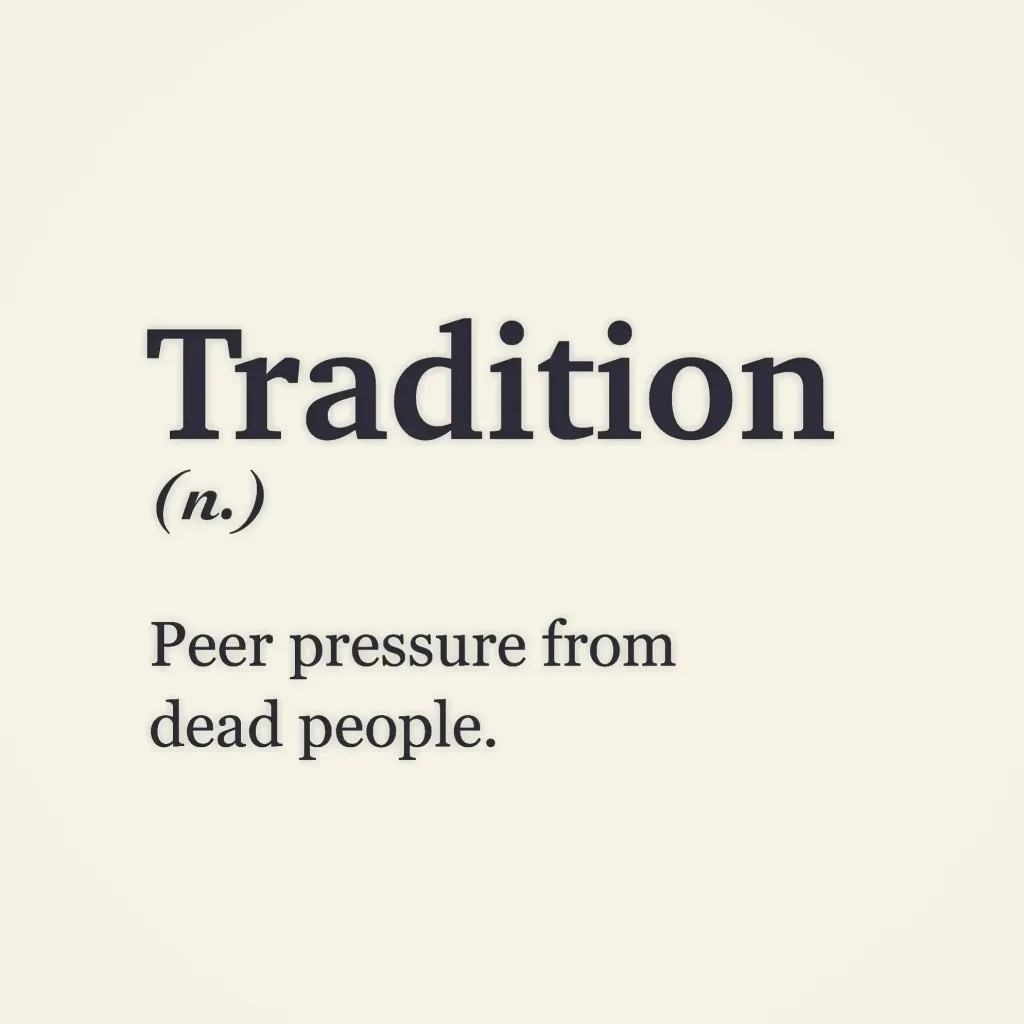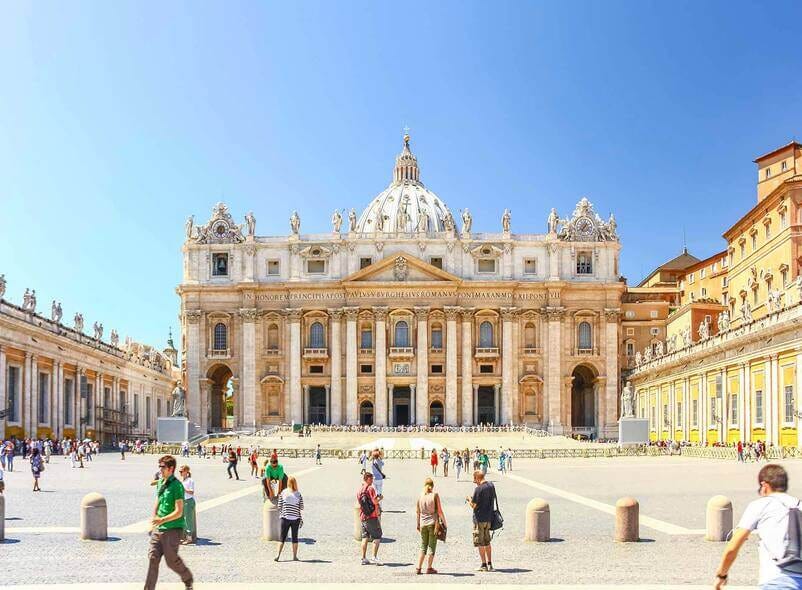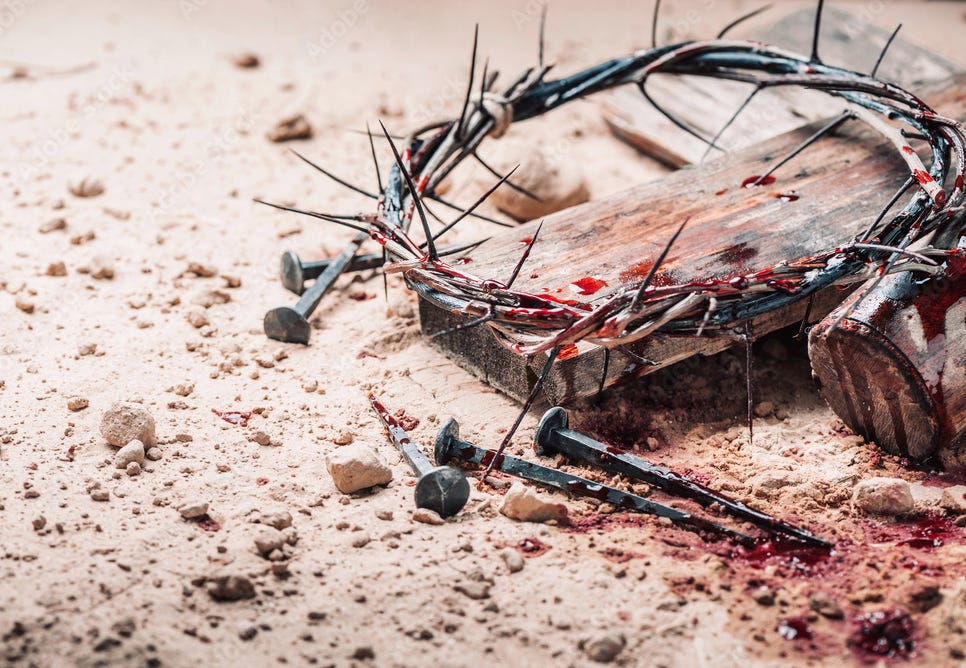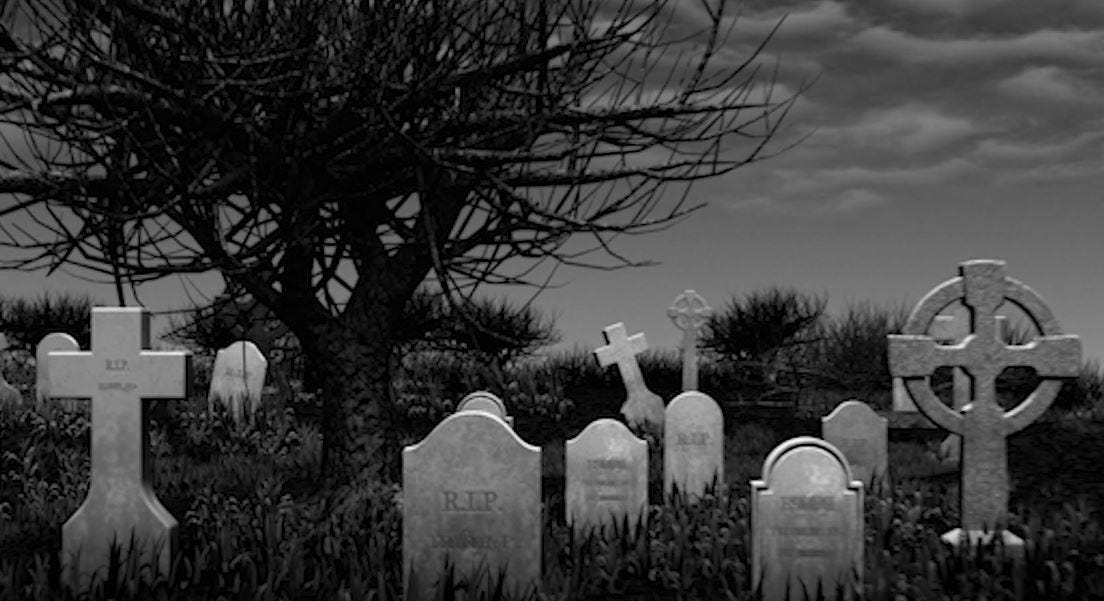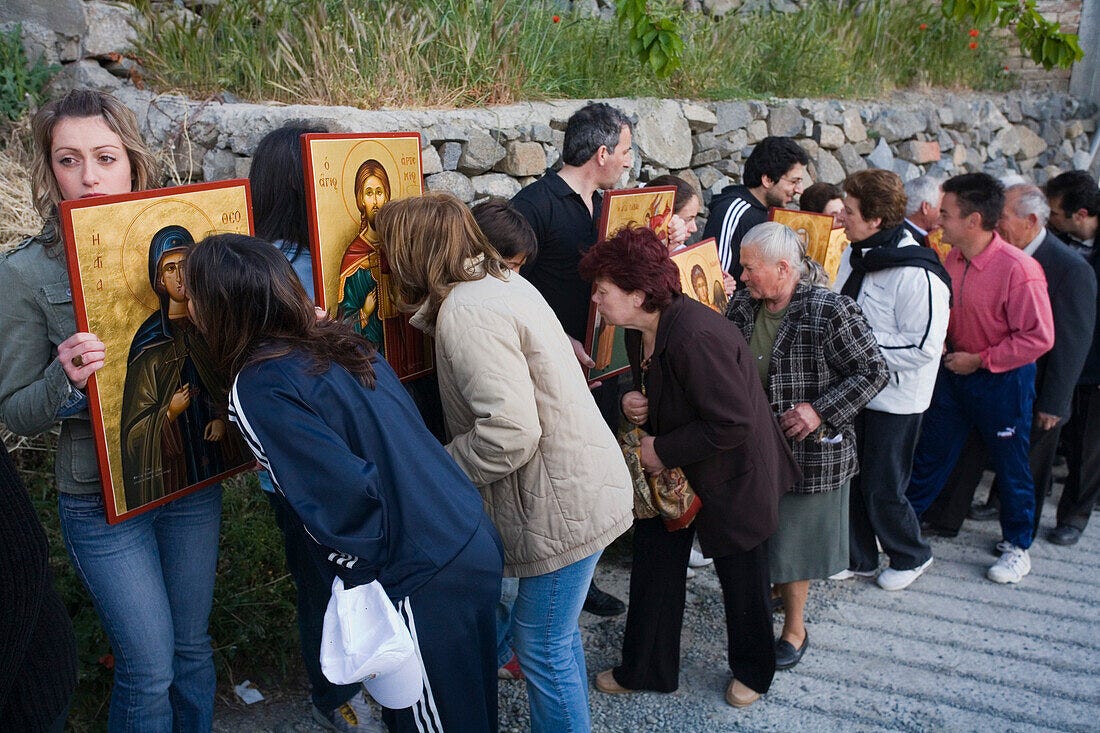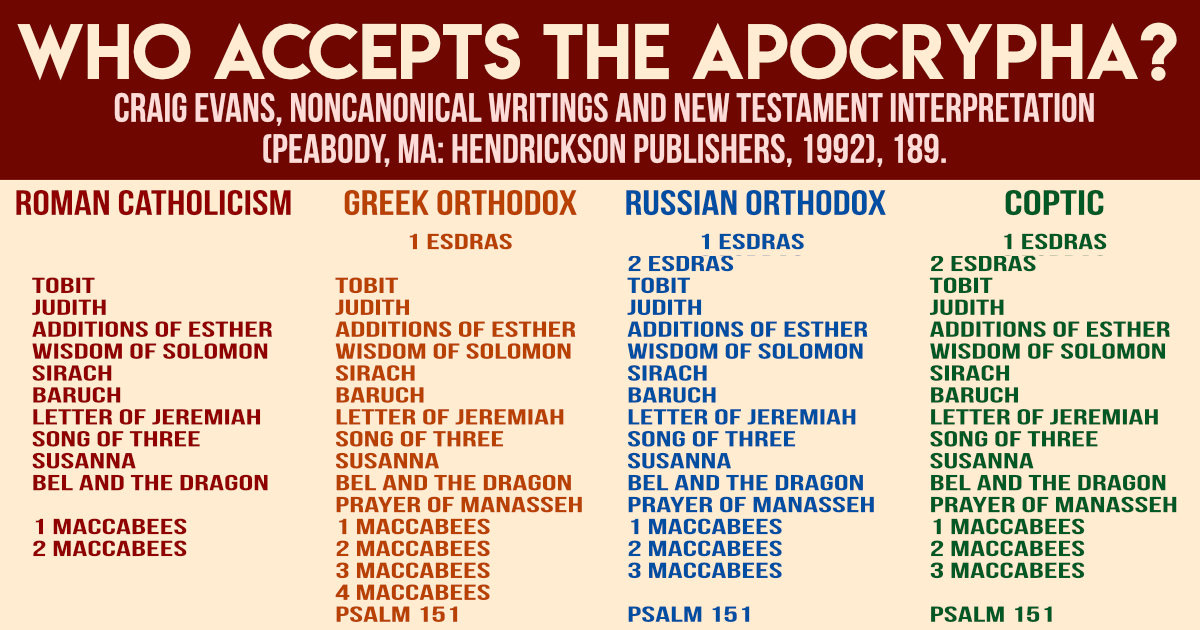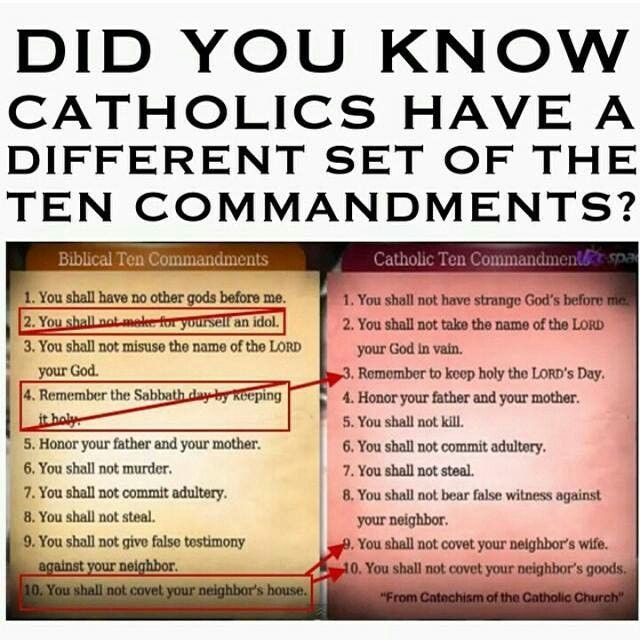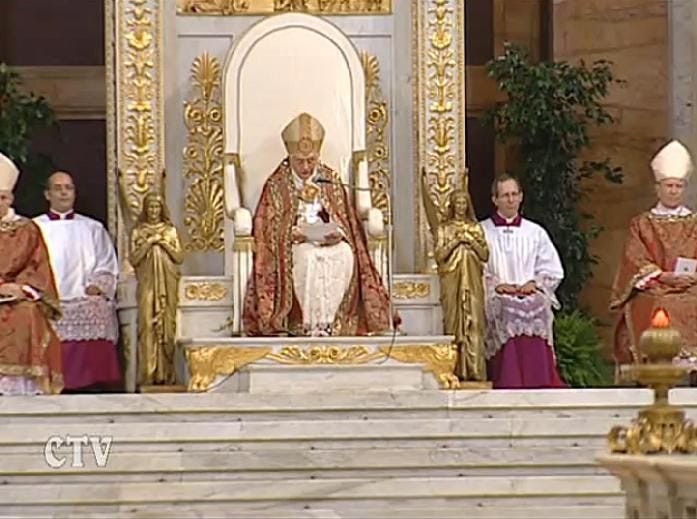Why Tradition Fails the Test: A Biblical Response to Roman Catholicism & Eastern Orthodoxy
(For the video documentary please go here.)
And he said to them, “Well did Isaiah prophesy of you hypocrites, as it is written,
“‘This people honors me with their lips,
but their heart is far from me;
in vain do they worship me,
teaching as doctrines the commandments of men.’You leave the commandment of God and hold to the tradition of men.”
And he said to them, “You have a fine way of rejecting the commandment of God in order to establish your tradition! For Moses said, ‘Honor your father and your mother’; and, ‘Whoever reviles father or mother must surely die.’ But you say, ‘If a man tells his father or his mother, “Whatever you would have gained from me is Corban”’ (that is, given to God)— then you no longer permit him to do anything for his father or mother, thus making void the word of God by your tradition that you have handed down. And many such things you do.”
Mark 7:6-12
As someone who grew up Eastern Orthodox and went to Catholic schools for 12 years, was also an altar boy and president of my church’s youth group, I believe I am being honest when I say that I have sufficient experience with organized religion, which is ultimately the Catholic system. Although Eastern Orthodox Christians will object to that last statement, the truth is that both history and the bible testify of the Catholic Church as the mother church, and while we will come back to this point later, the importance is that all denominations share something in common from their source.
This is why today I consider myself a “non-denominational” Christian, but to me it is simply Christianity as it was always intended — walking with Christ in one hand and with the bible in the other.
Disclaimer
The information presented in this study and in the associated resources and links is in no way meant to offend or assault Catholic or Eastern Orthodox Christians. I have friends in both categories and I have nothing against them personally. That being said, Christ’s stern words in Luke 14:25-27 about following Him over anyone or anything, including our own families, should stand as a solemn reminder that the truth must be valued above all things.
So, while this is not a personal attack against anyone’s beliefs, it is a serious look at something fundamental that concerns the truth: that is, are traditions equal to the truth? In our journey together today we will discern the answer to this very important question through the lenses of history and scripture, and for those who have eyes to see and ears to hear my prayer is that God quickens your understanding.
“The belief in the Bible as the sole source of faith is unhistorical, illogical, fatal to the virtue of faith, and destructive of unity.”
—The Catholic Encyclopedia, Sola Scriptura
Not All Traditions Are Equal
In my documentary on why the Jews are not God’s chosen people, I cover the emergence of Rabbinic Judaism in Babylon (because the temple was destroyed) as a parallel tradition/religion to the Levitical system. By the time the 2nd temple was rebuilt, there were actually two parallel systems running through Israel — the rabbis with their synagogues and the sacrificial system that God had given to Moses. Several centuries later when Christ walked the Earth, these divisions were so clear that the Lord rebuked the Pharisees for nullifying God's laws with their traditions (Mark 7:13).
So if the Jews, who today pride themselves on their traditions, were part of God’s chosen people of the Old Testament and came long before the Catholic Church, were rebuked by Christ for nullifying God’s laws with their practices — are we to believe that Christianity is immune from the same error? The answer is a resounding, “no.”
Many Catholic or Orthodox apologists will argue, and train their faithful to argue, that tradition is what created holy scripture to begin with. Meaning, of course, that the Protestant rallying call of “sola scriptura” (scripture alone) is self-refuting because tradition created scripture. While it is true that the tradition of training scribes to handle the transference of scripture from one generation to the other is what eventually gave us the bible, the bible teaches that all scripture is God breathed (2 Timothy 3:16) — meaning that this particular tradition (of writing God's words down) was supervised and managed by God Himself.
We cannot say that for all tradition(s), so the million dollar question is how does one know which is which?
The answer is that you use the bible as a lens to interpret, which is why Protestantism (protesting the Catholic system) was in essence a desire to return to objective truth without the pollution of man’s teachings and traditions. The Reformers recognized the errors of these things, and we will go over those errors here, although sadly Protestantism itself today is not free of the errors of tradition either. Nevertheless, because we know that the bible is God-breathed and therefore it cannot lie, because God cannot lie, we can compare a particular tradition to what God says in His word and see if it was guided by Him (just like the writing of scripture) or not.
This is the test, and it is simple for anyone willing to evaluate the evidence objectively without bias. Yet when we apply this test to the Catholic system, and its related systems (like Eastern Orthodoxy), it is clear that practically most of their traditions do not align with God’s words and this is what I hope to impart on you today.
Two Important Notes
The first note I want to make is that when the devil tempted Christ in the desert, he did so by using the word of God. In fact this is the devil’s trademark, to take what God has created and invert it or twist it around somehow. Why this matters is because the bible can be used to justify practically anything. Simply look today at those who teach the prosperity gospel or progressive Christianity and you will have plenty of evidence in this regard. But does this mean that no truth can be discerned from the bible whatsoever and we have to rely on tradition or the authority of a pope, bishop or priest to reveal it to us?
The answer is absolutely not, because the bible is objectively true regardless of our feelings or what people have said about it over time or what people say about it today.
The issue as always is context and proper hermeneutics (bible interpretation principles). The passages that the devil used to tempt Christ with are beautiful passages, it is the way the devil took them out of context for his own agenda that makes it wrong. In the same way, we must remember as we proceed through the evidence presented here that everyone can use the bible to defend their beliefs. The question as always is whether they are using it in context or not. In this regard I hope that I will provide you with sufficient evidence and explanations, as well as additional resources, to realize that the Catholic system of institutionalized religion fails the test of scripture over and over again.
This brings me to the second note. Eastern Orthodoxy is not Catholicism, because first and foremost it does not have a pope. Nevertheless, there are enough parallels between the two that are significantly contradicted by scripture. Although the items presented in this study are primarily directed at Catholicism, many of them are also relevant and applicable to Eastern Orthodoxy.
So now, with that out of the way, let us put institutionalized religion to the test. Is tradition the source of truth, just like the word of God is the source of truth? We will aim to find out.
The following are the major biblical tests against the Catholic system and why it fails. These are not listed in any particular order of importance.
Reason #1: Call No Man On Earth Your Father
Jesus said to not call any man on Earth your father, for you have one in heaven. (Matthew 23:9) The pope calls himself "Holy Father" (a title Jesus uses for God the Father, see John 17) and priests are called "Father" as well. The reason we are told not to call anyone on Earth our father, or our “spiritual father,” is because God alone is our spiritual Father and God (as Jesus Christ) alone is our mediator.
Fathership in the bible relates to who your source is. This is why Jesus told the Pharisees, who were bragging about their relationship and status with God, that their real father was the devil — because spiritually this was the truth. (John 8:44) Throughout the New Testament Jesus also authenticates both Himself and the Holy Spirit as being from the Father (John 16), because Jesus is God and is from God.
How this applies to the topic at hand is very clear. A true Christian who is born again is adopted into the family of God and becomes a child of the promise from having formerly been a child of wrath. (see Romans 8:15-16, 1 John 3, Colossians 1:13-14 and Ephesians 2:1-3) This means that, in God’s eyes, we go from being fathered by the devil to being fathered by God when we are saved. Therefore, the command not to call any man on Earth your father, let alone “Holy Father” or “spiritual father” stands in sharp contrast to these traditions and for very good reason. The pope is not your source, neither is your confessor or priest or bishop or monk. God alone is your Father as a born again believer, and Jesus Christ alone is your mediator.
Reason #2: Only One Mediator
The bible says that Jesus is the only mediator between God and man. (1 Timothy 2:5-6) In contradiction to this very important teaching, the Catholic System, and its daughters like Eastern Orthodoxy, have created countless mediators between man and God through their traditions. In Catholicism, Mary is all but officially taught as co-redemptrix, where most Catholics believe and treat her this way already. People in both religions also pray to saints, yet the bible teaches that once we die we do not go to heaven but await resurrection (Hebrews 7:25, and other places). More on this later, but priests are also intercessors for the believer through confession and praying on your behalf to Jesus, or to Mary, so that Mary in turn can bring your prayers to Jesus. Most Catholics or Eastern Orthodox do not feel they can approach Jesus directly, but instead go to Mary because she'll convince her Son to listen to you. All of this when taken together is a complete contradiction to the ministry of Jesus both on Earth and currently in heaven as High Priest, who intercedes for mankind with God so that we can approach God anywhere at anytime. (Hebrews 10:19-25)
Reason #3: Transubstantiation
The bible says that Jesus' sacrifice was done once for all time (Hebrews 10), and Christ’s famous last words were, “it is finished.” (John 19:30) A more accurate understanding based on the original language here is that Jesus said “it is paid in full,” meaning that the debt of sin had been paid forever without any more need for sacrifices. This is very important, because according to official Catholic teaching,(1)(2) transubstantiation requires that the mass be a sacrifice. In other words, Catholics are attending the sacrifice of Christ every Sunday, which is completely contrary to what the bible teaches about Jesus’ atonement. This applies to Eastern Orthodoxy as well, because it too teaches that Christ’s body and blood are transubstantiated during the liturgy. In fact, in the 17th century book Dignity and Duties of the Priest by Catholic author Alfonso Maria de Liguori, on pages 32-33, he describes the power of the priest to literally create the Creator by invoking Christ into the Eucharist.(3)
“Thus the priest may, in a certain manner, be called the creator of his Creator, since by saying the words of consecration, he creates, as it were, Jesus in the sacrament, by giving him a sacramental existence, and produces him as a victim to be offered to the eternal Father. As in creating the world it was sufficient for God to have said, Let it be made, and it was created — He spoke, and they were made — so it is sufficient for the priest to say, ‘Hoc est corpus meum,’ and behold the bread is no longer bread, but the body of Jesus Christ.”
Dignities & Duties of the Priest, p.32-33
Reason #4: The Second Birth & Baptism
Jesus says in John 3 that nobody can see the kingdom of heaven unless they are born again, and that being born again is like the wind — you don't know where it comes from nor where it is going. There is a play on words here because the word for "wind" and "breath" and "spirit" is the same in Greek and Hebrew (pneuma, ruah, respectively), and the point Christ is making is that one must receive a new heart and a new life by way of the Holy Spirit, through a conscious decision to repent and fully trust Christ, in order to be saved.
By contrast, the Catholic Church takes Jesus' words here, that one must be “born of water and the Spirit" to mean infant baptism, or baptism within the Catholic Church, in order to be saved. This applies to the Orthodox Church as well. But deep study of the context of this situation reveals that Christ is not talking about the obvious, i.e. being born physically, when He means “of water,” or even of water baptism. One reason for this is because He was talking to one of Israel’s top theologians, Nicodemus and Nicodemus wasn’t stupid.
What Jesus is saying in these verses is rather something much more profound, because it touches on the new covenant announced by God in Ezekiel 36, where God says He will sprinkle clean water on believers and put a new heart and new Spirit within them. All of these things work off of Old Testament pictures of the plan of salvation, like the laver in the sanctuary, and were designed to foreshadow the new reality in Christ, where God would do the work of renewing one’s conscience through the second birth, by way of the power of the Holy Spirit, which is like the wind: you neither know where (He) comes from nor where (He) is going.
Yet despite these profound truths, both Catholicism and Eastern Orthodoxy opt instead for a physical understanding of these passages, teaching water baptism for infants as a salvific work that we can perform. The problem is that Jesus isn’t speaking of water baptism, let alone baptizing infants. Baptizing an infant does nothing to change the heart because infants are not capable of conscious decisions, like repentance and faith. This is why there is an age of accountability. Someone can be baptized as an adult and later apostatize and become an atheist, which has happened plenty of times with organized religion.
Furthermore, the thief on the cross was never baptized with water, but rather repented and was saved. God cannot contradict Himself, so this means that water baptism as an infant, and even as an adult, is not how you are saved. Being baptized as an adult can be an important part of officiating an already existing transformation within the heart, but that transformation itself is an internal move of the Holy Spirit — which again, like the wind, you cannot control according to Christ because it is a move of God at His own discretion and timing.
Reason #5: No Salvation Outside the Church
Both the Catholic Church and Eastern Orthodox Church teach that there is no salvation outside membership in their churches. Yet the bible teaches throughout both testaments that there is no salvation outside of faith in God. In other words, it has always been about having a relationship with God — not being a member of a particular group. This is clear from studying Israel in the Old Testament. The apostle Paul says that “not all who are descended from Israel belong to Israel” in Romans 9:6-7, pointing to the reality that even within the chosen nation of Israel, God had a sovereign, electing purpose that included some (but not all) of the members of said group. Throughout the various judgments Israel received for their apostasy, there was always a remnant God had chosen to keep from apostasy (1 Kings 19:18) and preserve in faith. This remnant was the true people of God, and it was because God had chosen them to be faithful not because they themselves had more faith than their contemporaries. This is an important point that needs to be expanded upon.
Reason #6: The True Universal Church
In some sense Catholicism is actually right in its teaching that you must be a member of the Church in order to be saved. This is biblically accurate, but why it is also wrong is because the meaning of “Church” is not the Catholic (or Orthodox) Church, but rather the group of people God has determined to save. This group of people is not a denomination or an institution, but rather the true universal Church of God’s elect.
This group is called the body of Christ (1 Corinthians 12:12-27), the kingdom (Exodus 19:6, fulfilled in 1 Peter 2:9), the house of God (2 Timothy 2:20-22), the temple (1 Corinthians 6:19) and the Lord’s table (1 Corinthians 10:21). All of these terms in the New Testament are equivalent. They denote those who have fellowship with one another and with Christ because they have been born again. There is no other way to enter the Church, the kingdom, the house of God, the temple or the Lord’s table other than to be born again.
This is the bride of Christ spoken of throughout the bible. Christ said He would draw all (kinds of) men to Himself (John 12:32) and the bible tells us there is no distinction between Jew and Gentile anymore in Christ. (Galatians 3:28-29) Therefore, one’s status with God does not depend on membership to a denomination or an institution, which ultimately is determined by man, nor by infant baptism or confirmation or any such sacramental work. Rather, one’s salvation depends entirely on them being part of the true Church, the Israel of God (Galatians 6:16) which is the invisible, universal Church which is present in the hearts of men and women whom God has chosen to spiritually resurrect.
An easy proof of this is to see that not all who are members of religious institutions are saved, otherwise Christ would not have told us that at the end of time many will knock and beg Him to open, claiming to have done many might works in His name — only to be turned away as workers of lawlessness. (Matthew 7:22) These words make any genuine believer shudder and earnestly desire to confirm their own calling with God, but they also reveal that what one does or says about themselves (i.e. membership in a religion) does not guarantee their salvation.
Recall that Jesus also gave many parables about false converts, such as the sheep and the goats, the wheat and the tares, the parable of the sower, the wise and foolish virgins, the good fish and the bad fish and several others. If being part of the Catholic Church is how one is saved then these verses would have no meaning, because infant baptism and confirmation would be sufficient to keep one saved. Yet it is plainly obvious that this is not the case. So is God wrong? Or is tradition wrong? The answer is that tradition is wrong.
Reason #7: The Nature of Salvation
Another related point is on the nature of salvation. Both Catholicism and Eastern Orthodoxy hold to a “works and grace” based salvation, which is contradictory to the gospel of grace and the entire New Testament. In fact it is also contradictory to the Old Testament, because nobody in history was ever justified with God by any works. This is because God is a perfect judge, and a perfect judge cannot forgive sins. God doesn’t, in fact, forgive sins — rather He forgives sinners. This is very different and it is very important to understand.
Throughout history from Adam to Moses to Jesus Christ, God has always forgiven sinners through a propitiatory sacrifice. Leviticus 17:11 and Hebrews 9:22 both teach the same point: that there can be no forgiveness without the shedding of blood. But why? The answer is because God is a righteous judge and must punish sin. Being a Christian doesn’t mean your sins were swept under the rug. No, being a Christian means your sins were paid for by a perfect sacrifice. The Old and the New Testaments actually teach the same thing, the difference is that in Christ we have the once-for-all blood sacrifice that has appeased God’s wrath and vindicated His holiness as the Judge of the Earth.
Why this is so important is because at no point in history did God justify anyone by works of the law or by doing good things. It has always been by faith, through the grace God offered by allowing sinners to offer a sacrifice instead of their own lives as payment. This is fulfilled in Christ, and because Christ put an end to sacrifices we are free from the burden of ongoing atonement.
Now, in sharp contrast to these plain truths of the bible, we have the traditions of institutionalized religion. The Catholic Church teaches the sacramental system as necessary for salvation, and according to the Confession of Dositheus (an older document that is was written as a statement of faith in response to the Reformation by the Orthodox Church) it reads in Decree 13:
“We believe a man to be not simply justified through faith alone, but through faith which works through love, that is to say, through faith and works. But [the idea] that faith can fulfill the function of a hand that lays hold on the righteousness which is in Christ, and can then apply it unto us for salvation, we know to be far from all Orthodoxy.” (4)
Both of these churches deny what the New Testament plainly teaches on this very important issue. Paul says that we are justified by faith, apart from works of the law, (Romans 3:28) and Hebrews 11, often called “the hall of faith,” documents all of the major bible heroes in the Old Testament and how they were justified by their faith according to the grace of God. There are several reasons why the Catholic and Orthodox teaching on salvation is wrong, but they all boil down to one major error: these churches hold to a synergistic (freewill) view of salvation and reject what the gospel teaches on predestination. This will be expanded in the next point.
Reason #8: Predestination
It is undeniable that the bible teaches predestination, and while this is a hotly contested issue in today’s capitalistic, independent-minded, humanist, post-French Revolution world — the truth is the truth regardless of what we feel. In Acts 4:26-28 the bible tells us the cross was predestined, and what that means is that both those who would accept and reject Christ were predetermined by God. In fact the bible tells us that if those doing the murdering would have had their eyes opened by the Holy Spirit, they would have never crucified Jesus. (1 Corinthians 2:8)
The bible also has over 1800 prophecies, many of which have been fulfilled already and are verifiable with archaeology and historical records. Anyone who studies bible prophecy cannot in good faith argue against predestination, because having countless predetermined events by their very nature requires a predetermined reality. The bible says this reality is predetermined to reveal God’s glory, which anchors all things including the plan of salvation. Christ died on the cross to vindicate the glory of God for having passed over former sins, (Romans 3:25) and one day every knee will bow to Christ to the glory of God the Father. (Philippians 2:10-11)
This is a predetermined outcome and there is nothing man or the devil can do to foil God’s plans, and it is why the gospel is such good news.
It is good news because if God has indeed changed your heart and resurrected you spiritually, you have God’s word that He will preserve you because salvation is guaranteed through the Holy Spirit. (Ephesians 1:14, 2 Corinthians 1:21-22, Romans 4:16). Just like one cannot control becoming part of God’s Church through being born again, neither can one lose their gift of salvation (Ephesians 2:8-9) once God has given them the Holy Spirit. The gospel provides us with eternal security in God’s work, and that is why we can have the peace beyond understanding (Philippians 4:7) and also why God can receive full credit and glory for the outcome.
Yet now we reveal the great error of Catholicism and Orthodoxy. By rejecting predestination and embracing the free will of man as the determining factor in the outcome of salvation, the only possible result is a works-based gospel. If one must do certain things (like the sacramental system, or good works through faith) in order to obtain grace from God (or to keep it, for that matter) then it is no longer grace and no longer a gift that is freely given.
Out of the billions who will be damned, the few who will be saved by comparison will now have something to credit themselves for, namely the supernatural achievement of having faith despite the bible saying countless times that man is dead in sin and incapable of approaching God on his own will and effort. Truly this is one of the greatest mistakes of institutionalized religion and what the Reformers justly protested. If one chooses to be saved then he or she can also lose their salvation, which means that believers have no security in God’s work but rather are trusting their own efforts, or the efforts of their authority figures, to maintain their salvation and therefore departing from the gospel. It also means that those who do apostatize did so based on their own freewill choices rather than because they were never saved to begin with. This is an incredibly important point and it will be expanded upon in the next section.
Reason #9: The Nature of Apostasy
The gospel is Trinitarian in nature, and in that sense we see work being done by each of the Persons of the Trinity on behalf of God’s people for God’s own glory. The Father predestines and justifies and conforms those He gave to Christ (Romans 8:28-30). In John 6 alone, Jesus says that:
(i) nobody can come to Him unless they are granted by the Father, drawn by the Father and they have heard from the Father,
(ii) that it is the will of the Father that He (Jesus) should lose nothing the Father has given to Him but rather raise it up on the last day and
(iii) that Jesus chose the apostles and knew who would betray Him beforehand.
We know from other places that the Spirit is also involved in the plan of salvation by His conforming work, His work to regenerate the heart of the dead sinner, His work to convict the believer of righteousness (John 16:8-10), His work to impart various gifts (1 Corinthians 12) and His presence as a guarantee of God’s inheritance with Christ, as cited previously.
Why all of this is so crucial to understand is that anyone who holds to a synergistic view of salvation (Protestants included) now has a serious problem to reconcile. For those who do apostatize, how do you explain their apostasy? The monergist (i.e. the one who believes God saves someone without their cooperation or input, according to His predestined plan and for His glory) will tell you that these people were never saved, because God’s work cannot be undone and true believers cannot apostatize.
The synergist, however, will tell you that these people stopped believing and therefore lost their faith because of their own choices. Yet if this is true it must allow room for blasphemous outcomes, and this is the core of the issue that nobody ever seems to notice. What the synergist essentially says in their beliefs is that there must be room for Christ to fail at keeping the sheep God the Father gave Him, that the Father failed at drawing people effectively to Christ even though He predestined and justified them before time, and that the Spirit failed to convict a believer of righteousness, failed to conform Him to Christ’s image and failed to act as a guarantee of God’s promises — all because of man’s freewill.
In other words, man is more powerful than all the actions of the Trinity on his own behalf. Despite Christ interceding in heaven on behalf of believers, the synergist must admit that they believe these intercessions are powerless to keep anyone saved, and this is why the fundamental underpinning of Catholicism and Orthodoxy, as well as any Protestant who aligns with such beliefs, is contrary to the word of God.
Although Protestants have rightly rejected the sacramental system, they have held to its philosophical foundation, which is synergism, and this is why Arminianism was declared a heresy by the Synod of Dort when it was created in the 17th century. Jacobus Arminius was also a subordinationist, and the subordinationist tradition of the church fathers — as well as their influence on Catholic and Orthodox teachings — is clear for anyone to see because all subordinationists fall away from grace in favor of works. They have to, because subordinationism by its nature diminishes Christ and therefore diminishes the gospel.
While Catholicism and Orthodoxy deny subordinationism, those who have studied these things will point to many elements, such as a monarchical understanding of the Trinity and their reliance on works or sacraments, as evidence that “old habits die hard.” To the chagrin of Catholcism and Orthodoxy, the truth is that in this particular regard there is not much difference between them and Unitarians, Mormons and Jehova’s Witnesses.
Reason #10: The Afterlife
The Hebrews were unique for their views on the afterlife because they did not believe in an immortal soul that persisted after death. I document this in my Afterlife Series, because most people today do not realize where the belief in an immortal soul comes from. All pagan religions shared this in common, because all pagan religions had underworld rites where they communed with the dead, prepared for an existence in the spirit realm (like the Egyptians) and even believed this physical reality was a trap that needed to be escaped (like Greek Gnosticism).
Yet the bible is clear on this issue. Every human being lives and dies, and then is resurrected. Some will be resurrected to life with Christ while others will be resurrected to destruction in the lake of fire. (John 5:28-29) We do not go to heaven as believers, we are resurrected and will enjoy the Earth in its maximum glory along with the physical presence of Christ. (Revelation 21, 22)
What many do not realize is that very early in the Church’s history there was an influx of Greek and pagan converts (3rd-4th century) which imported these beliefs into the faith because Greeks and pagans were obsessed with the immortality of the soul by way of their Platonic philosophies. By that point Constantine had also fused Christianity with the state to create a counterfeit system, compromising on many things for the sake of peace and unity and the rest, as they say, is history.
All of these things are documented in detail in my End Times Series, especially the history of the Church and the counterfeit system that both John and Daniel warned us about. It goes without saying that Catholicism is this system, and the daughters of Mystery Babylon (like the Orthodox Church) are also under indictment. We are told by God to get out of her so that we do not share in her plagues, and again I do not mean to offend anyone’s faith but the truth must be proclaimed and those with ears to hear must be warned.
Either way, these beliefs about life after death are very old. But as is the theme throughout this study — just because something is old and held onto by lots of people does not make it correct. With all this in mind we now turn to the Catholic Church and its teachings of purgatory, which are not grounded whatsoever in reality nor in scripture. These teachings delude people into a false sense of security, that their salvation can change after death through more work or perhaps intercession by their families here on Earth — yet nothing could be farther from the truth.
Once you die that’s it. That is why death is designed to bring us despair and make us run to the Savior. If one dies with a hardened, unregenerate heart they cannot be saved. We do not know the state of the heart of anyone, but we do know the truth of the gospel and that is why we are told to proclaim it to the world. God will handle the rest and convict those who He has chosen to convict and adopt.
Nevertheless these traditions are also popular in Eastern Orthodoxy. While Orthodoxy rightly rejects the teaching of purgatory, both religions offer prayers for the dead and pray to the dead (martyrs, Mary, etc.) — both of which are not only contradicted by the bible but sharply warned against. The reason is that when one directs their spiritual attention and worship or prayer to anything dead, it opens the door for demons to deceive through false signs and wonders, dreams, visions and self-revelation.
This is dangerous territory, and certainly not something I plan to document heavily here because I have a whole series on it, nevertheless a simple example is with the Fatima appearances.(4)(5) Anyone with a shred of biblical discernment can simply compare what this apparition spoke and claimed alongside with the bible to clearly see that this was not, in fact, Mary appearing to these children but very likely a demon or the devil himself.
Mary would never ask you to continue doing good works to be saved, or to continue to sacrifice or to pledge your allegiance to her rather than to Jesus Christ. In the occult world, Mary is seen by occultists as a symbol of Lucifer (see Isis Unveiled and The Secret Doctrine by Helena Blavatsky, grandmother of the new age movement and a famous Satanist). For bible-based Christians we know that Mary is dead and waiting resurrection just like everyone else, so what does this mean? It means that the bible is right when it tells you to have no dealing with the dead or pray to the dead or on behalf of the dead, because you are opening the door to commune with demons. (1 Corinthians 10:20)
Reason #11: Veneration
The second commandment warns us to not create an image and bow down to it, yet both Catholicism and Orthodoxy are riddled with countless icons or statues of various saints, Mary, the Apostles and even Christ that people ritually bow down to, kiss and pray to. My mother prays to an icon of Mary that she herself painted, and which she lights a candle to every night. Of course, you can imagine our conversations on this issue and how they might go. Nevertheless, in light of the previous points, the error is obvious. Every single one of these saints is dead and waiting resurrection, so if one is collecting icons or statues or little prayer cards with various martyrs’ pictures on them — who or what is one praying to? At the very least nothing, and the very most spiritual powers that seek to deceive and lure you away from Christ.
The bible warns that the devil himself is transformed to an angel of light (2 Corinthians 11:14), and history proves this through examples like that of the Mormons with Joseph Smith and Islam with Mohammad, both of which claimed to have been visited by angels with revelations. Despite all of these warnings and evidence, Catholicism and Orthodoxy still believe that venerating images of various kinds is in alignment with the word of God.
Now, apologists will quickly make a distinction between “veneration” and “worship,” yet in practice no such distinction exists. When a relic (which is part of a dead body) of some saint came to my Orthodox church and people would line up to bow to it and kiss the glass containing it, hoping to be blessed by God, this is nothing short of idolatry. Again, I have nothing against anyone, but we must use discernment. We are all guilty of idolatry in some sense or another, but these are deceptions that need to be avoided because Orthodoxy and Catholicism have elevated the teachings and traditions of man to be equal the word of God — where the Holy Spirit would never guide you to do such things.
Reason #12: The Nature of Prayer
In Matthew 6:7 Jesus instructs us not to pray like the heathens do, thinking they will be heard for their many prayers. Today this can still be seen in the mystical practices of the Buddhists and Hindus, as well as the Jews and Muslims. This is because they are all based on error, particularly the error of synergism discussed earlier. Because these practices put the onus of responsibility on man to do something, rather than God, the thinking is that the “more” of that something you do (pray, meditate, chant, bow down, etc.) the more likely God will respond to you or the more holy you become in some way.
These habits also tend toward mysticism, where especially in the Orthodox Church it is seen as a pious thing to shut yourself up in a monastery away from society and live a stoic life of repetitive prayer and self-denial. The Catholic Church is also guilty, as anyone who knows the history of the Jesuits and other various monk orders can agree. Mysticism is a pagan tradition, and mysticism relies on a synergistic view of salvation that you must do something to create an outcome. This impacts how prayer is viewed and seen in both religions, with the end result being the rote memorization and monotonous jumping through hoops that many, who become disillusioned with these religious systems, rightly criticize.
While there is nothing wrong with having a structured prayer, like reading from the Psalms, the error is believing that praying the rosary or saying various prayers (like the sinner’s prayer) a certain amount of times will create a spiritual outcome of some kind. Again to the chagrin of both churches, there is nothing different in this regard between Orthodoxy, Catholicism and the occult.
Reason #13: Cosmology
Another controversial point of difference between Catholicism, and really most of its denominational daughters, with scripture is that of cosmology. Modern views on creation, such as evolution and the big bang, are actually products of the Catholic Church. A Jesuit named Georges Lemaitre invented the Big Bang Theory, and all the major figures in astronomy for many centuries since the Renaissance were Catholic. This is a controversial opinion and by no means it is one I intend to fully defend here, because it would be beyond the scope of this study and because I have an entire Cosmology Series dedicated to this topic that goes into great detail on a variety of issues.
Nevertheless, the bible says in Genesis 1 that the sun, moon and stars were created after the Earth and that plants came before animals. It also says that sea creatures and birds were created on the same day. Evolution contradicts these truths and so does the Big Bang, both of which posit impossible happenings that are neither supported by science and logic nor by scripture.
It is also worthwhile to mention that the Vatican is associated to the largest telescope, nicknamed LUCIFER, on Mt. Graham in Arizona. Many have speculated regarding the specifics of this project, since there were many mountains that the telescope could have been put on — yet the Vatican fought the Arizona Native Americans for this particular land and Congress approved their bid, despite the Natives protesting with several resolutions against it in the 1980’s.
The Natives argued that Mt. Graham is a holy site, a portal into the spirit realm and is sacred to their people.(6) Catholic apologists will claim that the Vatican doesn’t own the telescope, and that the other agencies utilizing the area have nicknamed it LUCIFER (LBT Near Infrared Spectroscopic Utility with Camera and Integral Field Unit for Extragalactic Research).(7) Recently this name was changed to LUCI, which for anyone with knowledge into these things, can easily see the truth of what is really going on here. Nevertheless, the question is why does the Catholic Church, with its history of deceptions in cosmology and other questionable practices, have dealings with a telescope named after the devil on a pagan holy site?
There are answers to these ugly questions, but they are beyond the scope of this study and I will leave it at that.
Reason #14: The Apocrypha
A group of texts were written after the prophet Micah, who is the last in the Old Testament canon, and these texts are considered apocryphal. They have historical value, like the book of Maccabees, but they are not divinely inspired because they contradict the word of God. Out of the 300 or so references made to the Old Testament by the New Testament, not a single one refers to any of these texts. Despite this evidence, both the Catholic and Orthodox Churches consider the apocryphal texts as part of their bible in some form or fashion.
The following are a few examples of why the apocryphal texts are not divinely inspired:
In the book of Maccabees, a group of Israelites discover idols on dead soldiers and realize that they were killed because of their idolatry. The leader of the group, Judas, (a different Judas than the one in Jesus’ time) prays on their behalf and also starts a collection so that their sins could be forgiven. (2 Maccabees 12:40-46) This is contradictory to scripture because it teaches that we can pray for the dead and also do things in the world (like collections or other ceremonies) that somehow affect the afterlife of that person. But according to the parable of the Rich Man and Lazarus (Luke 16) and several other places we’ve already looked at, one’s fate is sealed upon death with no way to change this outcome. This is beside the greater point that Christ’s atonement was perfect and final, which means that there is nothing more we could possibly do to atone for those who died and rejected Him.
In the book of Tobit it teaches that “almsgiving saves from death and purges all sin.” (Tobit 12:9) This teaching is what justified heinous heresies like indulgences (selling forgiveness for money) by the Catholic Church in the 11th and 12th centuries and it is completely contrary to the bible and to what Christ taught and did.
In the book of Wisdom it is taught that God formed reality out of formless matter (Wisdom 11:17) but scripture teaches us that God formed everything from nothing simply by His word. (Hebrews 11:3) This may seem like an unimportant detail but it is actually very important. If God formed reality out of formless matter then He is not beyond time and space and that is an inconsistency with who we know God to be. God did not exist in a formless, material world. He existed beyond time and space and this is one of His main transcendent attributes. This inconsistency is just another piece of evidence that the apocryphal texts cannot possibly be divinely inspired because they teach a different God than that of the scriptures.
In the book of Baruk the author beseeches God to hear the prayers of the dead of Israel, (Baruk 3:4) but scripture is clear that the dead know nothing (Ecclesiastes 9:5) and that God is the God of the living, not of the dead. (Mark 12:27)
Reason #15: The Climate Justice Gospel
Particularly with the liberal Jesuit pope Francis, the climate change agenda has been taken into overdrive and all peoples and religions are rapidly aligning with the pope around this manufactured problem. I discuss why this is error in my article on a biblical perspective on climate change, and in my End Times Series I cover the sinister ecumenical agenda behind things like the Green Sunday movement, the COP summits, the “climate commandments” and other globalist schemes that underpin the (seemingly) noble desire to save the environment.
The truth is that this is yet another extension of the false gospel Catholicism teaches. Because Catholicism is synergistic, it interprets the world and reality from the view of man rather from the view of God. In the bible natural events and calamities were always a sign from God to repent, or to display God’s power in some way. God is in control of the weather and of all things that happen on Earth because He is sovereign. When Psalm 19 says that the heavens declare the glory of God, it is not just talking about nice summer days, but all things that happen in the heavens which includes hurricanes, thunderstorms, massive lightning, hail, meteor showers and anything in between.
While I will gladly admit we have not been perfect stewards of the Earth by any measure, the notion that changes in the climate and disasters like tsunamis are ultimately man-made is designed to obfuscate the truth and, ultimately, to unite the world into a singular system just like the bible predicts.
At a baseline level the climate change gospel hides that the end is nearing (since Christ prophesied many such signs would increase in frequency as the time drew near) and on a deeper level it is designed to unite the world under the Catholic system by way of a common goal that is outside of Christ — namely saving the environment.
Much like how all ecumenism works, these efforts always sidestep Christ and true doctrine because you cannot compromise with Jesus. With Charismatics, the Catholic church (who created the Charismatic movement, by the way) the ecumenical point is the Holy Spirit and spiritual experiences. With the Muslims it’s Mary. With the Jews it’s Abraham, like the Abrahamic Family House that was opened recently. With the Orthodox it is tradition, and with everyone else including the pagans it’s “Mother Earth” — which is also a pagan idea, yet apparently not pagan enough for pope Francis to exclude it from the opening lines of his famous Laudato Si.
In this way Mystery Babylon will unite all people to herself in a worldwide system of worship, and many will sadly fall for her schemes one way or another.
Reason #16: Changing Times & Laws
The book of Daniel warns that the antichrist power that would come would change the times and laws. (Daniel 7:25) Interestingly it also says that this power, which has a personal representative, would destroy many by peace. (Daniel 8:25) I’ve written and spoken about these things in great depth in my End Times Series, but they are worth mentioning briefly here.
It is obvious that Daniel is not speaking in generic terms when he warns that this power would change times and laws, because every king and empire ever to come around has always had its own laws and calendars. So, to believe this is speaking in generalities doesn’t make sense because it would be redundant and God does not waste any space in the bible. But if Daniel isn’t speaking about general times and laws, which laws and times is he speaking of? The answer is God’s laws and times.
In this regard, the Catholic Church stands indicted because she has changed the 10 commandments to suit her needs. The second commandment on images was conveniently removed and the last commandment on coveting was split into two to make up for it. The Sabbath was also changed from Saturday (the 7th day of the week) to Sunday, which is the first day of the week. These points require plenty of documentation, of which is available freely in my Sabbath Series. Nevertheless, history and scripture testify against the Catholic Church with its boasting that the mark of her authority is to have changed the Sabbath from Saturday to Sunday, through her countless Sunday laws and persecution of Sabbath keepers through the ages, the Inquisitions and modern day movements to unify the world back to her through the Green Sunday movement.
“Of course the Catholic Church claims that the change was her act … And the act is a mark of her ecclesiastical power and authority in religious matters.”
—Office of Cardinal Gibbons, through Chancellor C.F. Thomas, November 11th, 1895
Sadly many Protestants are deceived on this issue, which is why the Counter Reformation initiated by the Jesuits in the 16th century has nearly accomplished its purposes of bringing everyone back to the Mother Church. The late Lutheran pastor Tony Palmer famously said, “The protest is over,” alluding to the Joint Declaration on Justification by Faith for Good Works, signed between the Lutheran Church and the Catholic Church. I’m sure if Luther were alive he would probably have a heart attack, but here we are.
There are many things to discuss in this area, which overall boils down to the rising of Christian nationalism throughout the world and which will eventually give the means for the kings of the Earth to hand over their power to Mystery Babylon. There is no better candidate for this woman in Revelation 17 than the Catholic Church, and certainly history proves that such a system already existed for well over 1400 years from Constantine up until the French Revolution. Today we are in the short lull between this power going underground (the mortal wound to the beast in Revelation 13) to being loved and accepted as a worldwide system and receiving worship, and enforcing such worship with its mark of obedience.
Other important details about changing times and laws are as follows. Today we reckon the day as beginning at midnight, the darkest hour, yet God and the Hebrews, and later the Israelites, all reckoned the day with the arrival of sunrise. This also is contested, especially by legalist camps and Sabbath-keeping Christians, who have been deceived by aligning themselves with Talmudic Jews and their Babylonian traditions. I cover these things in my Sabbath Series, but nevertheless God is light and would not begin the day with darkness.
In a similar manner, our new year begins in January, when death reigns through winter and cold. Yet the real new year begins in the spring, when life emerges. This is why Christ was crucified in the spring and why the Hebrews reckoned the year from spring to spring. They had another yearly reckoning, that was from fall to fall, but it existed for religious and governing purposes. In either case, nobody in their right mind would have associated the death of all things in winter to a new beginning, because winter is when things end.
Our modern calendar is also rife with pagan influences and traditions. “January” comes from Janus, the Roman god of doors, and some of the months are named after Roman emperors like July and August. Most holidays, like Valentine’s Day and Halloween, are adopted and repackaged from pagan practices. Looking into the history of these celebrations will convict any sincere Christian from continuing to celebrate them. Even Christmas has very little to do with the actual birth of Christ, which was very likely on September 11th based on the visions given in Revelation 12 and their astronomical significance. I document this in the episode on Daniel’s 70 Weeks in my End Times Series.
Although I do not believe Christmas in and of itself is pagan, the truth is that the timing of current Christmas celebrations was adopted in place of pagan solstice celebrations — and modern consumerism has turned it into a pagan celebration of materialism and winter spirits rather than a solemn reminder that God became man on our behalf to save us from death.
This is yet another reason why the Sabbath is so central to God’s outline of time, because it is when Christ rested in the tomb on our behalf. In honor of this precious gift of life, purchased through His death, we who are biblically focused also rest intentionally and enjoy the Sabbath as the delight it is — not as a burden like the Jews make it and not as a tribute of allegiance to Rome as most of the world inadvertently treats it — but as a genuine reminder of the fulfilled plan of salvation in Christ as Provider, Creator and Savior.
Another point to consider on times and laws is the liturgical calendars of the Catholic and Eastern Orthodox Church. In the Old Testament, God created various feasts and holidays to point to Christ. Everything, in fact, points to Jesus, because Jesus is the most significant and important person in human history. He is the anchor of reality, the singularity which all things are headed to.
With that in mind, feasts like the feast of Unleavened Bread or Tabernacles or Passover were all designed in some way to relate to Christ and to the plan of salvation. The Old Testament is rich with pictures that anticipate the arrival of Jesus to the Earth, and the various holidays inaugurated by God were designed for this purpose. Like the Sabbath and its relationship to Christ’s death and resurrection (although the Sabbath is not just a holiday but a moral command), everything about time and seasons relates to Christ.
Yet because Catholicism has essentially recreated the sacrificial system, she has naturally changed God’s times to suit her agenda. Instead of holidays that point to Christ’s ministry, Catholic and Orthodox Christians are thrown into a ceremonial rat race of constant holidays honoring dead martyrs and various events of church history, as well as countless fasts and eating prohibitions on various days. The Orthodox are especially guilty of the latter, with fasts being proclaimed at various times like prior to Christmas or Easter for tradition’s sake.
While I do not have anything against fasting, and in fact have discussed it’s benefits quite a bit on my show, fasting as it is done in these churches is largely a useless endeavor. We must remember that the New Testament warns against asceticism in Colossians 2:18, which interestingly also warns against the worship of angels — something both churches are most certainly guilty of with their many images of various angels and prayers to Michael or Gabriel or any of the other archangels. But this is beside the point.
Asceticism, or physical self denial, is not commanded by the bible because it is useless at changing the heart. The Pharisees were professionals at the law, yet Christ called them whitewashed tombs because they were dead inside. (Matthew 23:27-28) Fasting, if being done strictly because someone in authority told you so, is a totally pointless activity. We do not fast because we have to, or because we need to. We fast because we want to, and even then one must examine their reasons carefully because the New Testament doesn’t make it a requirement to fast.
I once got into a discussion, which unfortunately ended poorly, with an Orthodox priest who sent out a homily message telling his members that “unless you fast you cannot be saved.” I’m sure not every Orthodox priest would agree with this, but this is the problem of religion in general and especially one which professes justification is by grace and works. In practice it always defaults to works, and my heart goes out to my Orthodox and Catholic Christian friends because they have zero assurance of salvation from the false gospels they are being taught.
Reason #17: The Pope
Eastern Orthodoxy does not have a pope, so this final point is really directed at Catholicism. The bible warns of an antichrist power that would rise from the Roman empire, have a personal representative, enter the temple and proclaim himself to be God, change the times and laws, destroy many by way of peace and utter many blasphemous things against God. In my End Time Series I document who this power is extensively, and the answer is that there is no other candidate for these prophecies than the papal institution.
While I will leave you to explore my episodes on Mystery Babylon, the Beast, the Mark of the Beast, the Image of the Beast, the Counterfeit Spirit and several others — we will briefly look at a few significant details here.
In my series I document how the pope was at some time called, “Our Lord God the Pope” and “Our Lord the Pope,” as well as the often denied by Catholics, “Vicar of Christ,” which really means “in place of Christ.” If one understands that the temple of God is spiritual in nature, then the power which walked into that temple and proclaimed itself to be God is obvious. The pope sits enthroned between two cherubim, which is a counterfeit of the ark of the covenant in the Old Testament, and calls himself a title reserved for God the Father, proclaiming to forgive sins and speak without fallibility.
The popes also wore the triple tiara, which is a counterfeit of Christ in Revelation wearing the many diadems. These are symbols of ultimate authority, and the devil has always wanted to be “like God.” Interestingly, the beast in Revelation 13, which is the medieval papacy (538 AD to 1798 AD), has blasphemous names on its heads and is wearing tiaras — both of which apply to the papal institution.
The origin of the title “Pontifex Maximus” is also highly suspect. The pope still goes by this title today, and it is a relic from Babylon that deserves being exposed. When the Chaldean priests were conquered they moved to Pergamum and maintained their religion with their high priest. Later when Julius Caesar conquered everything for Rome, Attalus III conferred his high priestly title to Julius as a show of submission, and Julius became the new god-king, Pontifex Maximus. The greatest pontiff, the Roman pontiff, the bridge builder, the bridge between heaven and Earth.
Today the pope still uses this title, and he certainly is the great bridge builder because the bible warns that by peace he will destroy many. Yet the world is largely blind to these things because it doesn’t consider history and also because views on the end times have largely been shaped by the Jesuits. Both futurism, where all things are pushed to the future (and concern the Jews), and Preterism, where all things are pushed to the past (and also deal with the Jews), were created by Jesuits to take attention off of the Catholic Church during the Reformation. Today most Protestants espouse Catholic eschatology whether they know it or not, and because of this they will easily fall into the trap of a false millennium, a false golden age, world peace and possibly even a false Christ.
Final Thoughts
I have discussed the errors of tradition extensively on my podcast and in my writings, and each of the points raised in this study are expanded upon in their own series of videos. Nevertheless, for anyone with an honest desire to learn the truth it is clear that both history and scripture testify against the Catholic system and its daughters, which includes the Eastern Orthodox Church.
The arrival of Christ to the Earth, and His subsequent death and resurrection, has signaled a profound new reality for mankind. It is a reality that is completely decentralized, yet centralized completely to God. It is a reality based on trust, knowing that God’s plan will unfold perfectly regardless of our cooperation — yet one that also invites us daily through the workings of the Holy Spirit to participate in through our gifts and calling.
In this reality we have communion with God any time, anywhere and without any pre-requisites or sacrifices. We are washed clean, not because God has turned a blind eye to our past sins but because God sees the perfect payment of Christ on the cross when He looks at us. We have the gift of the Holy Spirit, who guides us to all truth (John 16:13) and we have the gift of God’s word, the scriptures, which are sharper than any two edged sword. (Hebrews 4:12)
What all of this boils down to is that Christ came to do away with religion, not to create a new one. He came to abolish the need for it so that in the new space created there could instead emerge a relationship, without the burden of the law and the burden of effort. God needs nothing and owes nothing to anyone. Yet in His sovereign wisdom, He has chosen to reveal the truth to some of us and open our eyes so that we can repent and correct our alignment before the day of wrath.
If God has acted in your life, know for certain that He will not let you go. Religion is not the answer. In fact, religion is a step backward. The new reality is relationship, and that reality is fulfilled in the true Church which is the body of faithful believers who trust in Christ.
Unlike some Protestants, (although I do not consider myself Protestant other than protesting the teachings of the Catholic Church) I believe that there are those whom God has chosen to save among Catholics and Eastern Orthodox. We do not need to have perfect theology to be saved, because if that was the case nobody would be saved. We do however need a trusting relationship with Christ, and that is not something we as human beings can measure in other human beings.
I see my own mother’s faith and trust in the Lord, for example, and her submission to God’s will, even though I have had several arguments with her over the years on each and every one of the points outlined in this study. Do I believe she is lost? No, not at all. But God works in mysterious ways, and in His sovereign wisdom He has chosen not to give everyone an equal level of awareness. That’s OK. On the other side of this none of these debates will matter anymore. I trust it is all for the best, but nonetheless as someone who is grateful for God opening my eyes to these truths it is my responsibility to communicate them to others.
Should they choose to act on the truth or not is up to the Lord, but I genuinely hope this has been edifying and eye opening — at the very least to begin asking the big questions. Truth does not fear investigation, and we must embrace a desire for the truth regardless of how it makes us feel.
References
Catholic Encyclopedia, Sacrifice of the Mass, https://www.newadvent.org/cathen/10006a.htm
Thirteenth Session of the Council of Trent (Eucharist), https://www.ewtn.com/catholicism/library/thirteenth-session-of-the-council-of-trent-1479
Dignity of the priesthood, p.32-33, https://archive.org/details/alphonsusworks12liguuoft/page/n39/mode/2up
Confession of Dositheus, Decree 13, https://www.crivoice.org/creeddositheus.html
What happened at the miracle of fatima?, https://www.portugal.com/history-and-culture/what-happened-at-the-miracle-of-fatima/
7 Powerful Messages from Our Lady of Fatima: “The Grace of God Will Be Your Comfort”, https://www.churchpop.com/2019/05/13/7-powerful-messages-our-lady-of-fatima-gave-to-the-three-shepherd-children-pray-much-sacrifice-for-sinners/
Mount Graham: A Sacred Space Stolen then Defiled, https://www.azcentral.com/in-depth/news/local/arizona/2021/08/20/mount-graham-sacred-space-apaches-stolen-defiled/7903881002/


